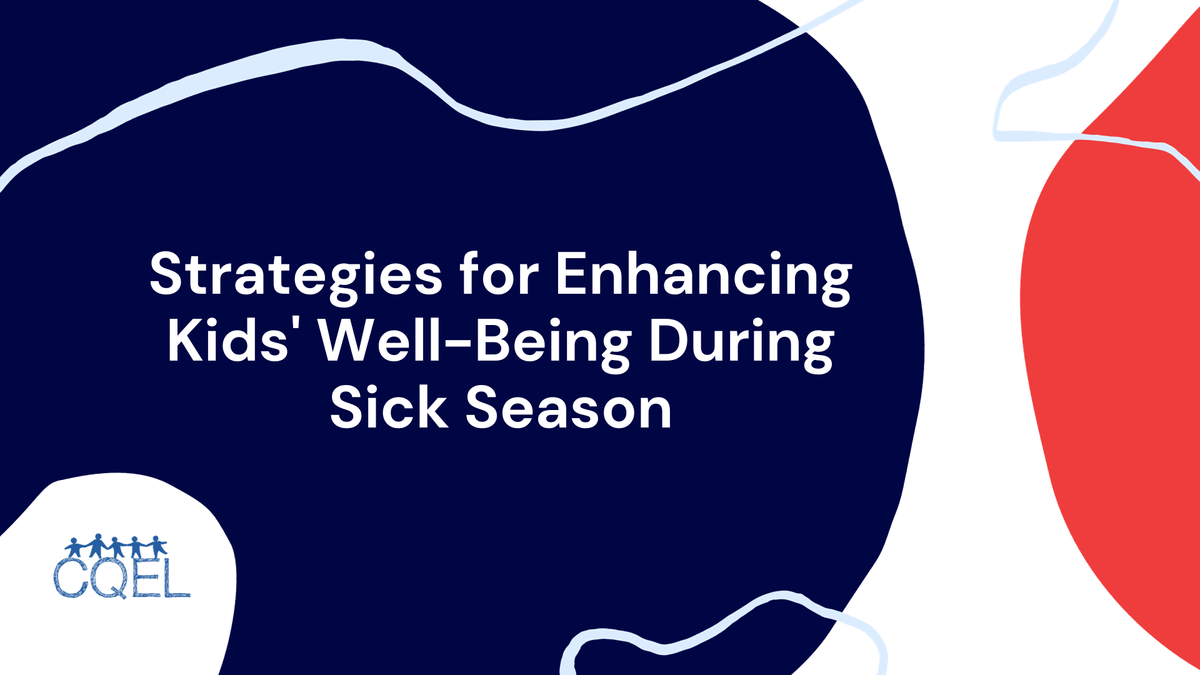Strategies for Enhancing Kids' Well-Being During Sick Season
It can also disrupt their social and emotional well-being, posing challenges for childcare providers. As responsible caregivers, we play a crucial role in supporting children during this time, ensuring their emotional needs are met alongside their physical health.

In the midst of sniffles and coughs, cold and flu season brings more than just physical discomfort to children. It can also disrupt their social and emotional well-being, posing challenges for childcare providers. As responsible caregivers, we play a crucial role in supporting children during this time, ensuring their emotional needs are met alongside their physical health.
When illness strikes, young children experience a rollercoaster of emotions. Frustration from feeling unwell can manifest in irritability and outbursts. Anxiety and worry may arise from fears of worsening symptoms or separation from caregivers. Feeling isolated from peers and activities they enjoy can trigger sadness and loneliness. Additionally, children may experience fear and anxiety surrounding doctor visits or medical procedures, adding to their emotional distress.
Understanding these potential reactions is vital for effective support. By recognizing each child's unique emotional challenges, we can tailor our approach to address their individual needs and provide the comfort and reassurance they require.
Here are five key strategies aspiring childcare providers in California can implement to enhance children's social and emotional development during sick season:
1. Fostering Positive Relationships:
- Individualized Attention: Spend extra time with children who are feeling unwell, offering comfort, listening to their concerns, and providing emotional support.
- Open Communication: Create a safe and welcoming space where children can openly express their feelings and anxieties without judgment.
- Empathy and Patience: Understand that illness can manifest in challenging behaviors. Respond with empathy and patience, avoiding reprimands or reactions that can exacerbate their emotional distress.
2. Maintaining a Routine:
- Regular Schedule: As much as possible, stick to a consistent daily schedule, even when children are sick. This provides a sense of normalcy and comfort during a challenging time.
- Age-Appropriate Activities: Offer stimulating activities adapted to children's developmental stage and physical abilities. This can include board games, puzzles, arts and crafts, or quiet reading.
- Limit Screen Time: While technology can offer entertainment, excessive screen time can negatively impact sleep and social interaction, especially during illness. Encourage alternative activities that promote well-being.
3. Promoting Positive Social Interactions:
- Small Group Activities: Organize small group activities that allow children to interact and play together while adhering to social distancing and hygiene practices.
- Storytelling and Read-alouds: Engage children in group read-alouds or storytelling sessions. This fosters connection, learning, and emotional expression.
- Creative Expression: Encourage children to express themselves through art, music, or other creative outlets. These activities can be therapeutic and help manage emotions.
4. Prioritizing Self-Care and Well-Being:
- Rest and Relaxation: Ensure children get adequate rest and relaxation to support their recovery and emotional well-being. Provide them with quiet spaces to nap or engage in calming activities.
- Healthy Eating and Hydration: Encourage children to eat nutritious foods and drink plenty of fluids. This strengthens their immune system and promotes overall health, aiding in recovery.
- Outdoor Time: When possible, allow children to spend time outdoors in nature. Fresh air and sunshine can boost mood, promote relaxation, and improve overall well-being.
5. Partnering with Families:
- Clear Communication: Maintain open communication with parents and caregivers regarding children's condition and emotional state. This ensures consistency in support and allows for collaborative problem-solving.
- Collaborate on Strategies: Work together with families to develop consistent approaches to supporting children's emotional needs during illness. Share best practices and resources to create a unified approach.
- Offer Resources and Support: Provide families with information about available resources, such as support groups or mental health professionals, to offer additional support beyond childcare settings.
By implementing these strategies, childcare providers can play a crucial role in supporting children's social and emotional development during the sick season. Creating a caring and supportive environment where children feel safe and understood is essential for their emotional well-being. By promoting positive relationships, maintaining routines, and prioritizing self-care, we can help children navigate this challenging period and emerge stronger and more resilient.
Additional Resources:
- National Center for Learning Disabilities: https://www.ncld.org/
- Centers for Disease Control and Prevention: https://www.cdc.gov/ncbddd/childdevelopment/index.html
- Zero to Three: https://www.zerotothree.org/the
